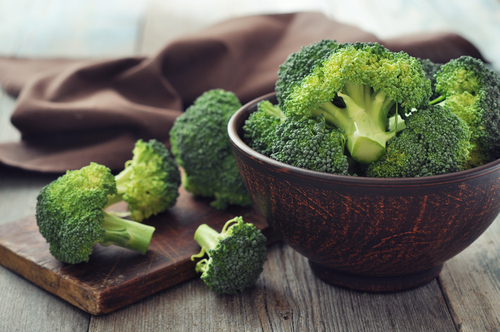Short answer
Broccoli is wonderful for you. Yes, it may cause some discomfort, as anything high in fiber can do so, but it is an all-star when it comes to your overall health.
Very healthy and numerous health benefits. A few harmful qualities may be associated, but only under certain circumstances such as an allergic reaction.
View Full Grading System
Category 'A'
Very healthy and numerous health benefits. Side effects are rare. Things rated an 'A+' are typically necessary for survival (for example, water).
Very healthy and numerous health benefits. A few harmful qualities may be associated, but only under certain circumstances such as an allergic reaction.
Very healthy and numerous health benefits. Harmful qualities may be associated, but aren't usually serious.
It is important to note that even the best things in life can become bad in immoderate amounts. So, although something may be rated an 'A+', overconsumption/overdoing can bring unwanted effects.
Category 'B'
Very beneficial to your health. Things rated a 'B+' may have a few harmful qualities to pay attention to.
Overall beneficial to your health. Things rated a 'B' may have some harmful qualities to pay attention to.
More beneficial to your health than not. However, harmful qualities are most likely associated and shouldn't be overlooked.
The main difference between category 'A' and category 'B' is the harmful qualities typically present in 'B' items. Serious side effects are usually uncommon, but are still possible and should be taken note of.
Category 'C'
Both beneficial and harmful qualities associated. Things rated a 'C+' are typically a bit more on the beneficial side. Still, moderation is important.
A fairly even ratio of beneficial and harmful qualities. Moderation is important. Very general topics that can lean towards both sides of the spectrum will be placed here as well. Rice, for example, can be good or bad depending on the type.
More harmful than beneficial. Side effects are common, especially when consumed/done excessively. Moderation is very important.
Category 'C' usually denotes to both good and bad qualities. When it comes to this category, it is important to keep this word in mind: moderation.
Category 'D'
Harmful to your health. Although benefits may be associated, the bad most likely outweighs the good. Moderation is very important.
Harmful to your health. A few benefits may be associated, but the bad outweighs the good. Moderation is extremely important.
Harmful to your health. Very few, if any, benefits are present. Things in this category should be avoided as much as possible.
Category 'D' is typically for things that are more harmful than beneficial. While consuming/doing something unhealthy once in a blue moon shouldn't hurt, we definitely recommend eliminating 'D' items as a regular part of your routine/diet.
Category 'F'
Category 'F' is for things that fail to bring anything beneficial to the table, and are very harmful to your health. We recommend completely avoiding anything in this category. Long-term side effects of 'F' items are usually very serious.
Category 'N'
'N' stands for neutral. Things placed into this category are generally (a) neither good nor bad for you, or (b) lack the necessary evidence to reach any conclusions.
Long answer
Broccoli is one of the best vegetables you can eat. Other than the risk of becoming gassy or having to use the toilet due to its high fiber content, there is nothing bad that can be said about broccoli (other than its taste, which is purely subjective). Broccoli may help prevent cancer, boost immunity, improve your cardiovascular system, lower cholesterol, and have a host of other benefits.
The first thing most people think of when healthy food comes to mind is the nutritional value. Broccoli is low in fat (only 0.5 gram per medium-sized stalk), contains no cholesterol, and is low in sodium. Broccoli is rich in vitamin C, containing twice the amount needed per day, and contains vitamins K, B6, and A as well. Minerals such as potassium, calcium, and iron are also present in sizable amounts. Besides their well-known benefits of protecting the eyes and aiding in calcium transport respectively, vitamins A and K are also synergistic in helping with the metabolism of vitamin D. The fiber in broccoli, which is soluble, binds to cholesterol and forces it out of the body, thus lowering overall cholesterol levels and helping to prevent plaque from building up in the arteries.
Broccoli also contains carotenoids such as beta-carotene and zeaxanthin as well as flavonoids such as kaempferol which help the immune system continue to function at an optimal level. Also good for the immune system is lutein, an antioxidant that aids in the fight against free radicals. Like all other cruciferous vegetables, broccoli may help prevent stomach and intestinal cancers, while its isothiocyanates may help reduce the risk of breast cancer.
Yet another benefit comes from its B-complex vitamins, such as B6, which possibly help to regulate the amino acid homocysteine, the excess of which increases the risk of coronary artery disease. So, back to the question. Brocolli is not bad for you. In fact, it is the complete opposite and should be included in any balanced diet.
Possible short-term side effects
- gassiness / disturb the bowels due to high fiber content
Benefits
- boosts the immune system
-
reduces risk of cancer
-
reduces risk of heart disease
-
lowers "bad" cholesterol
-
may help prevent macular degeneration
-
may help to slow and prevent osteoarthritis
-
promotes proper kidney function
Please turn your Ad Blocker off to see this content. Thank you!
Thank you for your feedback!
Written by Jeff Volling
Published on: 12-31-2015
Last updated: 12-10-2016
Thank you for your feedback!
Written by Jeff Volling
Published on: 12-31-2015
Last updated: 12-10-2016


 Approved by
Approved by 














